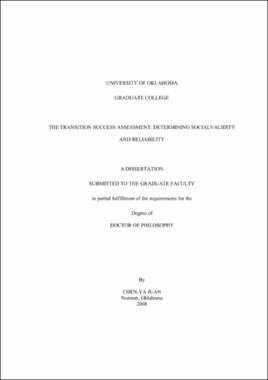| dc.description.abstract | Improving postschool outcomes for students with disabilities has always been a concern for educators, researchers, service providers, and parents. IDEA 2004 requires transition assessments to assist educators, families, and students with disabilities in determining postschool and annual transition goals. This two-phase study assessed the social validity and reliability of a new transition assessment instrument, the Transition Success Assessment (TSA). The TSA instrument, developed from 41 research studies, identified 41 predictor behaviors associated with postschool success for students with disabilities. The phase I study collected feedback and comments from eight focus groups (54 professionals, parents, and students) to modify and evaluate the usefulness of three TSA instruments. The Phase II study measured Cronbach alpha and test-retest reliability with 319 completed tests across all three TSA versions. The results of the Phase I study include two major findings. First, the number of the focus group modifications did not decrease over time. Second, focus group members agreed that over 90% of the TSA items were both understandable and beneficial. The Phase II study collected 319 completed tests from 201 participants (62 professionals, 35 parents, and 104 students) to assess the internal consistency reliability. The study also obtained 225 completed retests over test-retest correlation coefficients for a four-week interval across all three TSA instruments. Results of the Phase II study indicate all three TSA instruments display high internal consistency reliability (TSA professional α = 0.95, TSA family α = 0.94, and TSA student α = 0.93) and good and acceptable test-retest correlation coefficients (TSA professional r = .80, TSA family r = .89, and TSA student r = .76). This study found that the TSA appears to be a valid and reliable tool that secondary educators can use to identify annual transition goals, and that postsecondary educators can use to focus intervention efforts to improve the likelihood of postsecondary success. The implications of this study and future research needs are also discussed. | |
